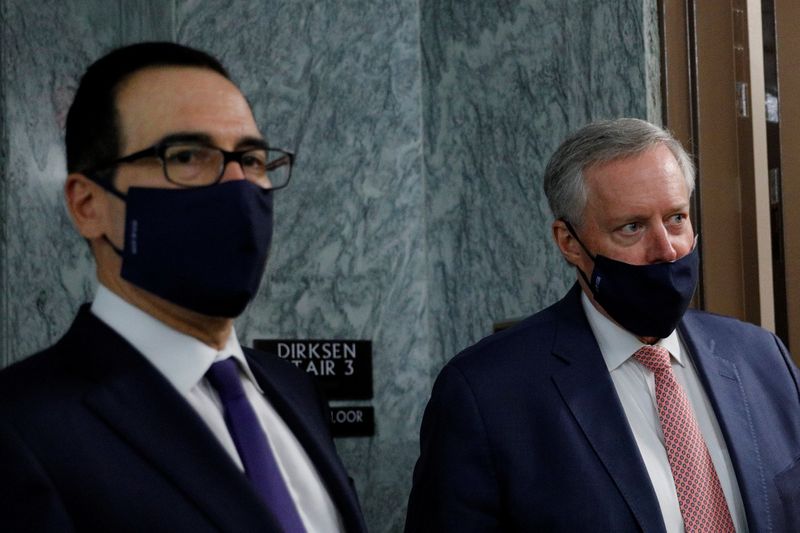By Valerie Volcovici
WASHINGTON (Reuters) - The Trump administration on Sunday called on Congress to pass a stripped-down coronavirus relief bill using leftover funds from an expired small-business loan program, as negotiations on a broader package ran into resistance.
The administration proposal, which Democrats dismissed as inadequate, was the latest twist in on-again, off-again talks to try to secure more stimulus, as the economy struggles to recover from coronavirus-related shutdowns that threw millions of Americans out of work.
In a letter to lawmakers, Treasury Secretary Steven Mnuchin and White House Chief of State Mark Meadows said they would continue to talk to Senate Democratic leader Chuck Schumer and House of Representatives Speaker Nancy Pelosi to try to reach agreement on a comprehensive bill.
But they said Congress should "immediately vote" on legislation to enable the use of the unused Paycheck Protection Program funds, which total around $130 billion.
"The all or nothing approach is an unacceptable response to the American people," they wrote.
A spokesman for Pelosi, the lead Democratic negotiator, did not immediately respond to a request for comment.
Representative Nita Lowey, the Democratic chairwoman of the House Appropriations Committee, rejected the administration's offer in a statement later on Sunday as "woefully inadequate."
"We can only reopen our economy and set the foundation for a strong recovery if we support state and local governments on the frontline of this crisis," Lowey said in a statement.
White House spokesman Brian Morgenstern told reporters the unused funds would be used to reopen the Payroll Protection Program, which expired earlier this year, to "allow businesses to continue to use it to keep their employees employed."
President Donald Trump on Friday offered a $1.8 trillion coronavirus relief package in talks with Pelosi after urging his team on Twitter to "go big" - moving closer to Pelosi's $2.2 trillion proposal. That came days after Trump abruptly called off negotiations until after the Nov. 3 election in which he is seeking re-election.
Trump's reversal and higher offer drew criticism from Senate Republicans, some of whom are uneasy about the national debt and whether a deal would cost Republicans votes next month.
Federal Reserve officials have urged Congress to be aggressive. The head of the Minneapolis Federal Reserve Bank said the recovery had "flattened out," indicating the need for further stimulus.
"A lot of people are suffering. A lot of small businesses are suffering," Minneapolis Fed chief Neel Kashkari said on CBS' "Face the Nation" on Sunday.
White House economic adviser Larry Kudlow said on CNN's "State of the Union" that Republicans would eventually come around.

"I think if an agreement can be reached, they will go along with it," he said, adding there would be "further efforts of negotiation" on a package this week.